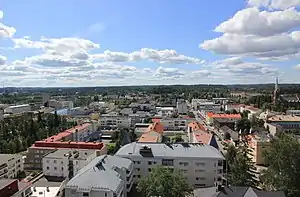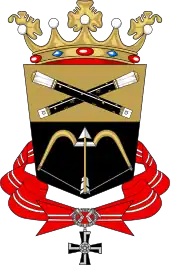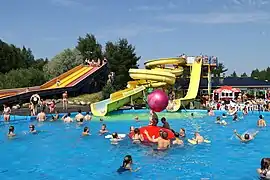Mikkeli
S:t Michel | |
|---|---|
Town | |
| Mikkelin kaupunki S:t Michels stad | |
 | |
 Coat of arms | |
Mikkeli within Etelä-Savo, Finland and Eurasia | |
| Coordinates: 61°41′20″N 27°16′19″E / 61.689°N 27.272°E | |
| Country | Finland |
| Region | Etelä-Savo |
| Sub-region | Mikkeli |
| Charter | 1838 |
| Government | |
| • Type | Council-manager |
| • Body | City Council |
| • Chairman | Oscar Valtola (NCP) |
| • City Board Chairwoman | Pirjo Siiskonen |
| • Mayor | Janne Kinnunen |
| Area (2018-01-01)[1] | |
| • Total | 3,229.57 km2 (1,246.94 sq mi) |
| • Land | 2,548.35 km2 (983.92 sq mi) |
| • Water | 424.7 km2 (164.0 sq mi) |
| • Rank | 23rd largest in Finland |
| Population (2023-09-30)[2] | |
| • Total | 51,972 |
| • Rank | 18th largest in Finland |
| • Density | 20.39/km2 (52.8/sq mi) |
| Population by native language | |
| • Finnish | 95.3% (official) |
| • Swedish | 0.2% |
| • Others | 4.5% |
| Population by age | |
| • 0 to 14 | 13.9% |
| • 15 to 64 | 58.9% |
| • 65 or older | 27.2% |
| Time zone | UTC+02:00 (EET) |
| • Summer (DST) | UTC+03:00 (EEST) |
| Website | www.mikkeli.fi |
Mikkeli (Finnish: [ˈmikːeli]; Swedish: S:t Michel; Latin: Michaelia) is a town and municipality located on Lake Saimaa in Finland. It is located in the Etelä-Savo region in what used to be the province of Eastern Finland. It has a population of 51,972 (30 September 2023) (around 34,000 in the town itself) and covers an area of 3,229.57 square kilometres (1,246.94 sq mi), of which 424.7 km2 (164.0 sq mi) is water. Together with Savonlinna, it is one of the largest towns in the South Savonia region and one of the concentrations in the region's hospital districts.[5]
Mikkeli was the site for the headquarters of the Finnish armed forces during World War II. In recognition of this, the town's coat of arms incorporates a pair of crossed Marshal Mannerheim's batons, and the town was awarded the Cross of Liberty, 4th Class, to be displayed with the coat of arms.[6]
History

The earliest signs of human life in Mikkeli are the Astuvansalmi rock paintings in Ristiina, dating back to 4100-2000 BCE.[7] The Astuvansalmi is the largest rock painting site in the Nordic countries.[8]
The peace treaty of Nöteborg in 1323, with which the pogost (church parish) of Savilahti was transferred from the control of Novgorod to Sweden, is the oldest written record of the settlement in the present region of Mikkeli. The locality received its present name Mikkeli after Archangel Michael by the early 16th century at the latest.[9]
On January 23, 1597, more than 200 peasant rebels were killed in the parsonage of Kenkävero in part of the larger Cudgel War. In the war waged by King Gustav III of Sweden against Russia, the Battle of Porrassalmi took place a few miles south of Mikkeli on June 13, 1789. In the battle the Swedes (Finns) victoriously defended their positions against superior numbers of Russians.
Mikkeli was granted town rights in 1838.[10] The provincial government of the province of Mikkeli that had been established in 1831, moved from Heinola to Mikkeli in 1843.
In 1918, during the Civil War, the headquarters of the White Army were established in Mikkeli.[11] Mikkeli was located in a conservative farming area and it was a White stronghold, but elements of the Russian Army garrison in the area supported the Reds. A major engagement was fought around the railway station at Mäntyharju, about 20 km (12 mi) to the south of Mikkeli, when the Whites blocked a Red thrust coming north out of Kouvola. During the Winter War and Continuation War, the headquarters of the Finnish Army was located in Mikkeli.[12] The Army staff made their base in a local secondary school. At the site of that school is the small Päämajamuseo (Finnish for 'Headquarters Museum') containing photographs and memorabilia of the era. As a result of serving as the headquarters of the army that was based there, Mikkeli was bombed heavily, but since there was almost no high-rise development at the time the damage was quickly repaired. Architecturally, most of pre-war Mikkeli doesn't exist anymore.
Wartime Mikkeli is identified with Marshal C. G. E. Mannerheim, the supreme commander of the Finnish Defence Forces and later President of Finland. His personal railway carriage, which he used as a command post during the war, is parked in a siding at Mikkeli Station. It is possible to look inside the carriage through its windows at any time, but public entry to the carriage is permitted only once a year, on Mannerheim's birthday (June 4). The carriage was the venue of Mannerheim's famous 1942 meeting with Hitler near Immola, during which their private conversation was secretly recorded; photographs of this meeting are on display in the carriage. Mannerheim was a regular diner at the Mikkelin Klubi, where his favourite drink was schnapps.
One of the main museums in the town is the Jalkaväkimuseo (Finnish for 'Infantry Museum'), located in one of the former army barracks, close to the University of Applied Sciences.[13] It contains exhibits from the four wars in Finland's modern history – the Civil, Winter, Continuation and Lapland Wars. The museum also contains an exhibit dedicated to Finnish war hero Lauri Törni.[14]
In 1986, there was a hostage crisis in Mikkeli when a bank robber drove from Helsinki with three hostages and parked there. When the police shot at the hostage taker's car he detonated explosives contained inside, killing himself and one hostage.
In 1997, there was a province reform, which made Mikkeli the capital of the new province of Eastern Finland. In a separate reform, the rural municipality of Mikkeli which had surrounded the town and the municipality of Anttola were consolidated into Mikkeli in early 2001. The municipality of Haukivuori was consolidated with Mikkeli on January 1, 2007, and likewise with Ristiina and Suomenniemi in 2013.
Geography

The centre of Mikkeli is located on a low rise, near the shore of a bay of Lake Saimaa.[15] There are several small lakes in and around the town. The lakes of the eastern parts of the town belong to the water system of River Vuoksi. In the west, the town reaches Lake Puula; this lake belongs to the water system of River Kymijoki.
Demographics
Population
The city of Mikkeli has 51,972 inhabitants, making it the 18th most populous municipality in Finland. The Mikkeli region has a population of 68,319. In Mikkeli, 4.6% of the population has a foreign background, which is below the national average.[16]
The city's population density is 20.39 inhabitants per square kilometre (52.8/sq mi).[3]
| Year | Population |
|---|---|
| 1990 | 54,404 |
| 1995 | 55,563 |
| 2000 | 55,222 |
| 2005 | 54,728 |
| 2010 | 54,455 |
| 2015 | 54,665 |
| 2020 | 52,583 |
Languages
Population by mother tongue (2022)[16]
Mikkeli is a monolingual Finnish-speaking municipality. The majority of the population - 49,531 people or 95.3% - speak Finnish as their first language. In Mikkeli, 85 people, or 0.2% of the population, speak Swedish.[16] 4.5% of the population of Mikkeli have a mother tongue other than Finnish or Swedish.[16] As English and Swedish are compulsory school subjects, functional bilingualism or trilingualism acquired through language studies is not uncommon.
At least 30 different languages are spoken in Mikkeli. The most common foreign languages are Russian (1.3%), Arabic (0.4%), Estonian (0.3%) and Farsi (0.3%).[16]
Immigration
| Population by country of birth (2022)[16] | ||
| Nationality | Population | % |
|---|---|---|
| 49,928 | 95.5 | |
| 427 | 0.8 | |
| 254 | 0.5 | |
| 134 | 0.3 | |
| 107 | 0.2 | |
| 102 | 0.2 | |
| 86 | 0.2 | |
| 82 | 0.2 | |
| 65 | 0.1 | |
| 61 | 0.1 | |
| 60 | 0.1 | |
| Other | 974 | 1.8 |
In 2022, there were 2,411 persons with a migrant background living in Mikkeli, or 4.6% of the population.[note 1] The number of residents who were born abroad was 2,352, or 4.5% of the population. The number of persons with foreign citizenship living in Mikkeli was 1,508.[18] Most foreign-born citizens came from the former Soviet Union, Russia, Estonia and Thailand.[16]
The relative share of immigrants in Mikkeli's population is below to the national average. However, the city's new residents are increasingly of foreign origin. This will increase the proportion of foreign residents in the coming years.
Religion
In 2022, the Evangelical Lutheran Church was the largest religious group with 73.1% of the population of Mikkeli. Other religious groups accounted for 1.9% of the population. 25.0% of the population had no religious affiliation.[16]
Education

A central campus of South-Eastern Finland University of Applied Sciences (Xamk) is located in Mikkeli and is a major employer in the city. Its history dates back to 1965, when Mikkeli was selected as the site for a new higher education college specializing in professional, engineering and vocational studies, enrolling its first class of students in 1969 while situated in an old Russian Army barracks on the outskirts of town. Purpose-built accommodations have since been added, but the old buildings are still in use, with the student union located in the "Officers' Club" building. The Polytechnic changed its name to Mikkeli University of Applied Sciences in 2006 and merged in the beginning of 2017 with Kymenlaakso University of Applied Sciences to constitute a new university: South-Eastern Finland University of Applied Sciences (Xamk).
Several other universities also have operations in Mikkeli. The Mikkeli University Consortium includes units from University of Helsinki, Aalto University (formerly Helsinki School of Economics), University of Eastern Finland and Lappeenranta University of Technology.[19] Aalto offers a highly ranked Bachelor of Science degree in international business, taught in English, which draws students and faculty from around the world.[20]
Traffic

Mikkeli has a fast road connection to capital area Greater Helsinki through Finnish national road 5 and Finnish national road 4, which is a four lane highway. Mikkeli has a railway station on the Savonia railway with five trains to and from Helsinki, daily. There are also bus connections to neighboring cities and municipalities and a small local bus transit network within the city limits. Mikkeli also has its own airport, which however has had no scheduled commercial flights since 2005.
Culture
Mikkeli boasts its own concert hall, which is a world class facility built in 1988 to commemorate Mikkeli's 150th anniversary as a town. The concert hall is the home of St. Michel Strings chamber orchestra, and also provides the main venue for the annual Mikkeli Music Festival, which attracts musicians and audiences from across Europe.[21] The Mariinsky Opera, led by Valery Gergiev, performs there regularly.[21]
Tourism

Mikkeli is a major holiday resort within the Finnish lakeland area. A well-known and popular travel centre and theme park Visulahti is in Mikkeli, located in the shores of Lake Saimaa.[22] Mikkeli is a popular area for summerhouses due to its vast amount of lakes; in 2020, there were over 10,000 summer houses in Mikkeli, the second most in Finland increasing the population during the summer months.[23] A major part of tourism is based on nature and especially lakes.
Due to Mikkeli's role as the headquarter city in World War II, the town has several museums dedicated to that period of time. These museums include the Infantry museum, the Lokki Communications Center, and the Headquarters museum.[24]
The annual trotting event St Michel ravit is Mikkeli's largest event with approximately 20 000 spectators.
Hotels are concentrated in the center of Mikkeli. In other areas, there are rental cottages scattered in the smaller villages and countryside.
Sport
.jpg.webp)
Jukurit is an ice hockey team from Mikkeli, which competes in the Finnish premier league, Liiga. The team has won six Mestis (second highest league) championships (2001, 2002, 2003, 2006, 2013 and 2015).[25]
Mikkelin Kampparit plays in the highest bandy division.[26] In 2012, they became Finnish champions for the first time.[27]
Mikkeli has two major football teams, Mikkelin Palloilijat (MP) and Mikkelin Pallo-Kissat (MiPK). Both of them have played in the Finnish premier league, currently MP is playing on the second highest level and MiPK on the third highest. The former EU commissioner Olli Rehn used to play for MP for 13 years (youth teams 1968–78, first team 1979–82).[28]
Notable people
International relations
Twin towns and sister cities
Mikkeli is twinned with:
Notes
References
- ↑ "Area of Finnish Municipalities 1.1.2018" (PDF). National Land Survey of Finland. Retrieved January 30, 2018.
- ↑ "Preliminary population statistics 2023, September". StatFin. Statistics Finland. Retrieved October 26, 2023.
- 1 2 "Demographic Structure by area as of 31 December 2022". Statistics Finland's PX-Web databases. Statistics Finland. Retrieved September 6, 2023.
- ↑ "Population according to age (1-year) and sex by area and the regional division of each statistical reference year, 2003–2020". StatFin. Statistics Finland. Retrieved May 2, 2021.
- ↑ Gråsten, Hanna (October 17, 2019). "Näkökulma: Keskustan 18 maakunnan unelma säröilee – Ministeritkin hääräävät savolaisten herruustaistelussa" [Perspective: The Centre's dream of 18 provinces is shattered, ministers battle over Savonian autonomy]. Iltalehti (in Finnish). Archived from the original on December 8, 2022. Retrieved September 14, 2023.
- ↑ Iltanen, Jussi (2013). Suomen kuntavaakunat. Kommunvapnen i Finland [Finnish municipal coats of arms] (in Finnish). Helsinki: Karttakeskus. pp. 133–134. ISBN 9789522660923.
- ↑ Seitsonen, Oula (January 2005). "Shoreline displacement chronology of rock paintings at Lake Saimaa, eastern Finland". Before Farming. 2005 (1): 6. doi:10.3828/bfarm.2005.1.4. ISSN 1476-4253. Archived from the original on September 14, 2023. Retrieved September 14, 2023.
- ↑ "Astuvansalmi leads you to the ancient mysteries of Lake Saimaa". Visit Mikkeli. Archived from the original on June 4, 2023. Retrieved September 14, 2023.
- ↑ Korpela, Jukka (2008). The world of Ladoga: society, trade, transformation and state building in the eastern Fennoscandian forest zone c. 1000-1555. Nordische Geschichte. Münster: LIT Verlag. p. 85. ISBN 978-3-8258-1633-9.
- ↑ Hall, Thomas (December 16, 2003). Planning and Urban Growth in Nordic Countries. Routledge. p. 71. ISBN 978-1-1358-2987-2.
- ↑ Upton, Anthony F. (1980). The Finnish Revolution: 1917-1918. University of Minnesota Press. p. 489. ISBN 978-1-4529-1239-4.
- ↑ Carruthers, Bob (May 2012). "10". Hitler's Forgotten Armies: Combat in Norway and Finland. Bookzine Company Limited. ISBN 978-1-7815-8099-8.
- ↑ "Museum Exhibitions". Jalkaväkimuseo. Archived from the original on April 16, 2021. Retrieved September 14, 2023.
- ↑ Nargele, Dominik George, Lt. Col., USMC (Ret.) (2008). Terror Survivors and Freedom Fighters. Bloomington, IL: AuthorHouse. p. 35. ISBN 978-1-4678-3743-9. Retrieved September 14, 2023.
{{cite book}}: CS1 maint: multiple names: authors list (link) - ↑ Symington, Andy; Dunford, George (2009). Finland (6th ed.). Footscray, Vic.: Lonely Planet. p. 145. ISBN 978-1-74104-771-4. Retrieved September 14, 2023.
- 1 2 3 4 5 6 7 8 9 "Number of foreign-language speakers grew by nearly 38,000 persons". Statistics Finland. May 31, 2023. Retrieved September 12, 2023.
- ↑ "Persons with foreign background". Statistics Finland. Retrieved September 18, 2023.
- ↑ "Population structure 2000-2022, urban-rural classification". Statistics Finland. May 26, 2023. Retrieved September 12, 2023.
- ↑ "LUT University". MUC. Archived from the original on September 24, 2020. Retrieved September 14, 2023.
- ↑ "International Business, Bachelor (BScBA, Mikkeli) and Master of Science (Otaniemi) in Economics and Business Administration". Aalto University. August 17, 2018. Archived from the original on September 19, 2020. Retrieved September 14, 2023.
- 1 2 "Mikkeli Music Festival in brief". Mikkelin Musiikkijuhlat. Archived from the original on January 29, 2023. Retrieved September 14, 2023.
- ↑ Visulahti Travel Centre & Theme Park
- ↑ "Katso lista! Nämä ovat suomalaisten 15 suosituinta mökkipaikkakuntaa". www.iltalehti.fi (in Finnish). Retrieved August 6, 2020.
- ↑ "Museums - Visitmikkeli". www.visitmikkeli.fi. Retrieved August 6, 2020.
- ↑ "Jukurit HC Oy". Mestis. Archived from the original on February 8, 2014. Retrieved June 1, 2014.
- ↑ "Suomen jääpalloliitto". Finland's Bandy Association. Retrieved June 1, 2014.
- ↑ Kampparit new Finnish Champions in bandy Archived April 19, 2014, at the Wayback Machine
- ↑ "Olli Rehn - Personal Profile". European Commission. Retrieved April 28, 2014.
- ↑ "Harri Kirvesniemi". Sports Reference. Archived from the original on April 17, 2020. Retrieved February 15, 2018.
- ↑ "Mikko Kolehmainen". Sports Reference. Archived from the original on April 17, 2020. Retrieved February 15, 2018.
- ↑ "Olli Kolehmainen". Sports Reference. Archived from the original on April 17, 2020. Retrieved February 15, 2018.
- ↑ "BANK OF FINLAND - Erkki Liikanen". Bank of Finland. Archived from the original on April 28, 2014. Retrieved April 27, 2014.
- ↑ "Olli Rehn CV". EC webpage.
- 1 2 3 4 5 6 "Ystävyyskaupungit ja -kunnat". mikkeli.fi. Archived from the original on April 29, 2014. Retrieved April 28, 2014.
- ↑ "Vennskapsbyer". kommune.no. Archived from the original on March 4, 2016. Retrieved April 26, 2014.
